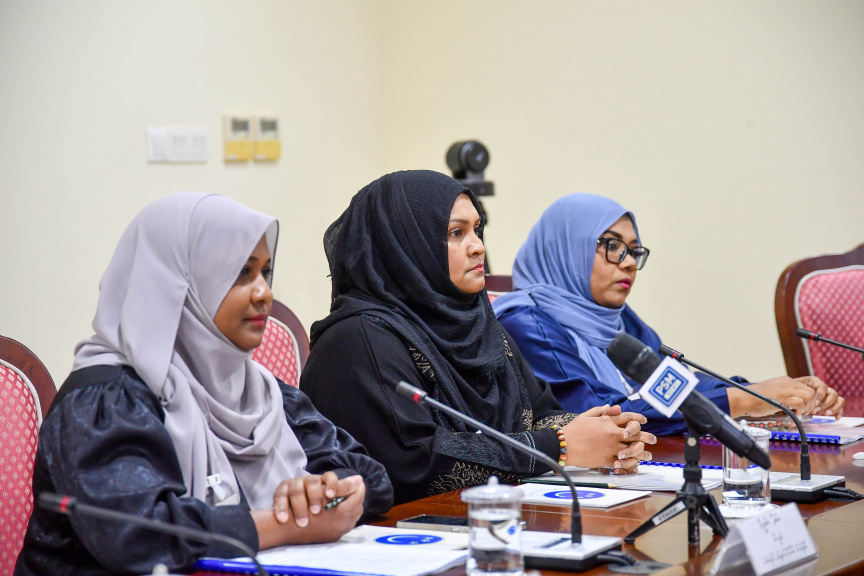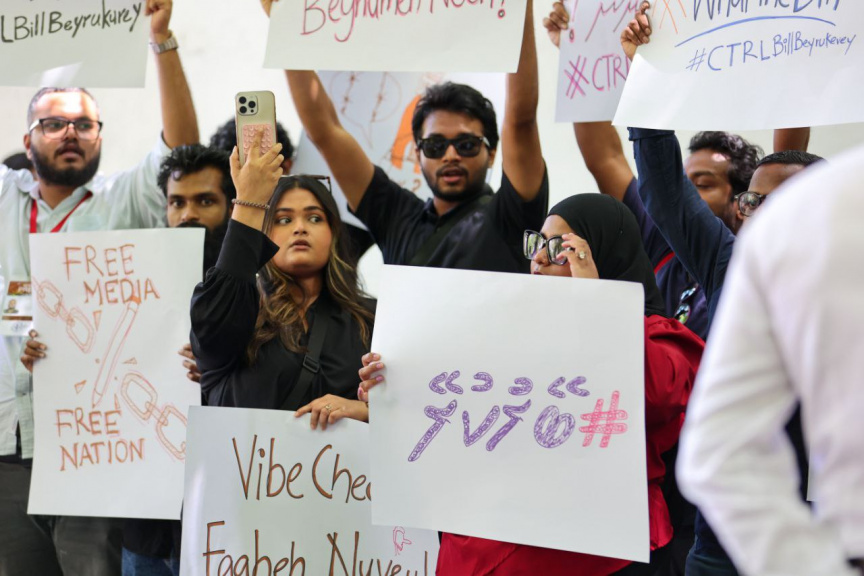
Maldives Broadcasting Commission (BroadCom) officials attend a meeting with the Parliament's Independent Institutions Committee on August 31, 2025. (Photo/People's Majlis)
Officials from the Maldives Broadcasting Commission (BroadCom) expressed concern on Sunday over not being consulted during the drafting of the contentious media control bill that has been submitted to the Parliament.
On August 18, Thulhaadhoo MP Abdul Hannan Aboobakr, an independent lawmaker aligned with the government, submitted a bill that seeks to dissolve the Maldives Media Council (MMC) and the BroadCom, replacing them with a single regulatory body — a seven-member Maldives Media and Broadcasting Commission (MMBC), composed of four members elected by the media and three appointed by the President of the Maldives with parliamentary approval, with the President also given the authority to appoint the commission’s head. It also empowers the MMBC to impose major penalties against media outlets as well as individual journalists, including during the investigative stage.
The bill, widely panned both local and international journalism groups, is openly backed by the People’s National Congress (PNC) administration. The Parliament, which is currently in recess, held an extraordinary sitting as journalists demonstrated against the bill outside the Parliament on August 27, during which the ruling party used its supermajority to accept the bill and send it to the Independent Institutions Committee for review.

The committee, which has set a set a September 15 deadline for the bill, with a 10-day window for public opinion, and a three-day window for consultation with media outlets and other stakeholders, summoned members of the BroadCom for a meeting on Sunday morning.
At the meeting, BroadCom’s president Safa Shafeeq expressed concern over lack of consultation with the commission when drafting such a significant bill.
She also stressed that the bill requires extensive research, but it is clear that no stakeholders were consulted during the drafting process.
One of the key concerns she raised is regarding the implications of merging BroadCom and MMC – something that she said requires rewriting a lot of rules, regulations and policies.
She said that it requires a lot of discussion, and that even one year is not enough for such an enormous task.

Safa added that the new bill also fails to address budgetary constraints.
Shafa said that while BroadCom is mandated to run trainings for journalists and other programs to advance the broadcasting field, it is unable to do anything beyond barely covering the payroll due to the small budget.
“We are unable to do anything for the media because of our small budget. There’s nothing in the budget for this. We found the same issue with this [bill],” she said.
Safa said that given the budgetary constraints that the commission already faces, it is important that the new commission formed from merging BroadCom and MMC gets a big budget that is enough to fulfil its mandate.

In addition to allowing the President power over appointment of its members, the new bill also empowers the proposed commission to impose major penalties against media outlets as well as individual journalists, including during the investigative stage. This includes:
At the meeting, BroadCom member Sarahath Izzath expressed concern over the major penalties prescribed in the bill. She said determining fines for individual journalists require proper research that takes into account their income, living expenses, and other important factors.

“The fine amount for individual journalists must be set based on quantitative research. We cannot calibrate fair and productive fines that holds the media accountable without infringing on press freedom without compiling quantitative data on economic and media variables and qualitative input on legal and social factors,” she said.
Sarahath also said that BroadCom works closely with international organizations and institutions, and establishing a new commission could disrupt these partnerships and collaborations.
The commissioners acknowledged that the purpose of the bill is to make media more accountable, but warned that drafting such a significant bill requires extensive research and consultation.
They said that the consultation process should have been carried out during the drafting process, and not after the fact.